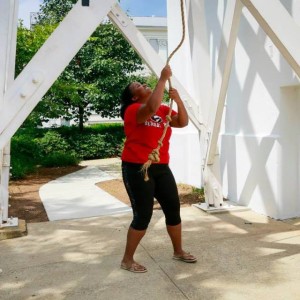Growing up in Cordele, Georgia, a small rural town approximately 4 hours south of Athens, I was raised in an environment where I went through a lot of feelings of isolation and depression. Being one of the only minority females who excelled academically, I didn’t fit into the average “black girl” stereotype. I was constantly teased for “talking white” by people in the black community, but to the white community, I was obviously black enough to not be fully accepted into the culture.
I was perpetually stuck in the middle; not accepted by either group, and forced to rely on family members for acceptance and validation. When you combine that with divorced parents and strained family communication, you get a recipe for a lot of insecurities and vulnerability issues.

Mental health has always been a recurring theme in my life, but I don’t think I ever truly realized the importance of it until I got to college and was forced to start dealing with my inner demons.
When I first came to college, I was lost.
Lost in a sea of 30,000 people, trying to fit in with the crowd and do what I thought would grant me popularity among my peers. I floated around my first semester, insecurities on full blast, going to parties, drinking with friends, and trying to prove my “black-ness” to my peers; only being pushed deeper and deeper into a cycle of self-doubt, regret for coming to UGA, and self-hatred. I constantly felt like I was not the right size, not pretty enough, and just not desired in general.

Not being able to excel as a pre-med student, I often questioned my intelligence and if I truly belonged here. My GPA was mediocre at best by the end of first semester. To sum it all up: my first semester was a disappointment, layered with self-doubt and insecurities that only pushed me deeper into a well of depression and suicidal thoughts.
That semester was pivotal for my growth and maturity as a student, and I truly believe without that semester, I wouldn’t have found my true passion: mental health and the importance of self-care and self-love.
During winter break of freshman year, I visited a Christian counselor that I saw during high school to deal with issues that arose from my parents’ divorce. During high school, it was more so suggested from my parents; this time was different. It was solely my decision, and I truly felt like I needed it; being in a dark place for a long time made me realize that I wasn’t myself, and I wasn’t enjoying my life like I should have.
During that period of counseling, I faced my worst critic of all time: myself.
I challenged my need for wanting acceptance, wanting love, and explored why I felt so disappointed about my first semester in college. With my counselor, I shared my inner-most thoughts and insecurities, and talked about heartbreak, rejection, and depression.
But from that experience, I gained so much. I realized the importance of my mental health and how it is the core of everything I do and how I function. I realized how importance self-love is, and how crucial it is for people to address their issues before they begin to spiral out of control.
This is what drives my passion. After dealing with my own experiences, I have seen what neglecting mental health can do to a person. I choose to fight the stigma against mental health so that others can feel safe expressing themselves, and others can realize that they do not have to suffer alone. Mental health is sorely ignored in the world and it needs to be addressed and I choose to fight the dangerous statistics associated with that neglect plaguing our college campuses and across the nation.
-1 out of every 4 college students suffers from some form of mental illness, including depression
-Suicide is the third leading cause of death among college students
-Every year, 1200 college students nationally commit suicide
I truly believe that God’s purpose for me is in the mental health field and that I am here to help others who have struggled the way I have. It’s time for society to let go of the stigmas that have paralyzed individuals seeking help. It is a lengthy task, but I believe that we can be the generation to end the stigma. It starts with us.






